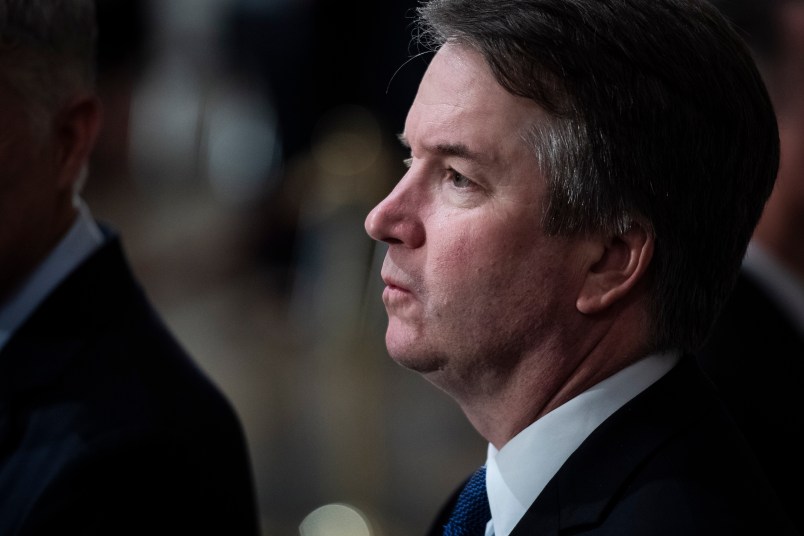The Affordable Care Act appears poised to survive its third confrontation with the Supreme Court largely intact.
At oral arguments Tuesday in a lawsuit brought by red states and supported by the Trump administration, Obamacare’s defenders got signals that there are likely at least five votes on the conservative Court in favor of preserving the bulk of the law.
A pivotal moment came early on in the hearing, when Justice Brett Kavanaugh indicated that he was leaning towards a key pro-Obamacare argument being made in the case: that even if the court finds the challenged ACA provision unconstitutional, it can sever that provision from the law and leave the rest of the act still standing.
“I tend to agree with you that this is a very straightforward case for severability under our precedents meaning that we would excise the mandate and leave the rest of the act in place,” Kavanaugh said, as he questioned Donald Verrilli, who is representing the U.S. House of Representatives in its defense of the law.
The lawsuit alleges that the GOP-led Congress rendered the whole law unconstitutional by zeroing out the individual mandate in its 2017 tax overhaul legislation.
Regardless of where the Court comes down on the unconstitutionality of the individual mandate, a Kavanaugh vote in favor of severing that provision — coupled with the expectation that Chief Justice John Roberts will uphold the law, as he has in the first two challenges — would let the rest of the law go untouched.
The arguments put forward by Republican states for why the whole law must come down were always treated extremely dubiously, even among conservative legal minds who backed previous legal challenges to the 2010 law.
Nonetheless, the challengers secured a full victory from a very conservative trial judge, and an appeals court punted on the case, prompting a coalition of blue states and the U.S. House of Representatives to ask for the Supreme Court’s intervention.
The death of Justice Ruth Bader Ginsburg earlier this fall raised fresh concerns that the Supreme Court could adopt Texas’ extreme arguments, as none of President Trump’s appointees have ever weighed in on an Obamacare case and Justices Samuel Alito and Clarence Thomas voted against the law in the two previous challenges.
But on Tuesday Kavanaugh repeatedly expressed his doubts that a ruling striking the mandate would mean that the whole law must be dismantled, as most of the red states and the Justice Department were claiming.
Addressing Texas Solicitor General Kyle Hawkins, Kavanaugh said that looking at the Court’s precedents on severability, it seems “fairly clear” that the mandate could be struck down while the other ACA provisions are left untouched. He asked Hawkins how the challengers get around those precedents, which Kavanaugh said seemed “on point” in this case.
Living up to expectations, Roberts too appeared unlikely to go along with the Republicans’ arguments.
Addressing Hawkins, Roberts said that “I thnk it’s hard for you to argue that Congress intended the entire act to fall if the mandate was struck down, when the same Congress that lowered the penalty to zero did not even try to repeal the rest of the act
“I think frankly that they wanted the court to do that, but that’s not our job,” Roberts said.
He also zeroed in on the so-called standing arguments — i.e. the question of whether the challengers had shown types of harm from the ACA that would make it appropriate for the federal judiciary to intervene.
Roberts, addressing acting U.S. Solicitor Jeffrey Wall, who was backing the challengers, said that the theory that the Justice Department was putting forward on why the red states met that threshold “really expands standing dramatically.”
Kavanaugh and Roberts were not the only sources of headwinds for the challengers’ among the GOP appointees.
Justice Alito — who at one point suggested that some members in Congress may in fact have intended the whole law to be invalidated when they voted to zero out the mandate — nonetheless showed some doubts about Texas’ severability arguments.
“There was strong reason to believe that the individual mandate was like a part of an airplane that was essential to keep the plane flying, so that if that part was taken out, the plan would crash,” Alito said, referring to the arguments Obamacare’s defenders put forward in the 2012 Supreme Court case challenging the mandate. “But now, the part has been taken out and the plane has not crashed.”
He asked Texas how, then, the Court should explain why the whole law should go down with an invalidation of the individual mandate.







As I read it Roberts questions why they should be expected to do what Congress would not.
And the other four think throwing people off insurance, and totally disrupting the entire US insurance market in the midst of a worldwide pandemic is a good idea?
A matter of Constitutional principle?
Punt, you idiots.
The Rapist is lying. They don’t want to give any signs of their intention to destroy Obamacare until after the Georgia Senate race is complete.
Roberts
You said it.